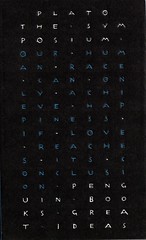 This is the seventh book I (randomly) picked to read out of the Penguin Great Ideas Series. It's number 23 in the list and part of series one (the blue series).
This is the seventh book I (randomly) picked to read out of the Penguin Great Ideas Series. It's number 23 in the list and part of series one (the blue series).If it wasn't for the slight mysogeny and rampant sexism in this book, I would absolutely love Plato's 'Symposium'. As it is, I can only love it with reservations (though it is pretty awesome).
The Symposium is a philosophical dialogue written by Plato sometime after 385 BC. It is a discussion on the nature of love, taking the form of a series of speeches, both satirical and serious, given by a group of men at a symposium or drinking party at the house of the tragedian Agathon at Athens.
It stars Socrates, Plato's teacher, which is interesting in itself, because, while Socrates was a real person, we only really know of him through the writings of others. It wasn't something that I'd really thought about before, until reading this wikipedia entry, where Socrates is refereed to as a character. 'But he's real!', I cried, 'Wasn't he??'. It threw me for a second, but it served a good reminder that, while Plato remains largely hidden in the text, he *is* present because he wrote it (I'm sure others didn't need this reminder).
Also included in the back is The Allegory of the Cave, which describes Socrates view of reality as we know it (shadows) and *true* reality, made of real forms. I'd actually heard of this allegory before, thanks to Sophie's World (which was my first and possibly *only* foray into philosophy), so it was good to reread relatively familiar concepts in a different context. (Although I do think many much of modern science dilutes the effect of Socrate's theory).
But why did I love 'Symposium' so much?? Well, it's all about love isn't it - and not just love - platonic love between men and their boyfriends. It's all rather sweet. Rather than a non-sexual affectionate relationship, *real* platonic love is chaste only because sexual energy has been transmogrified! Oh my! As I mentioned before, women get a pretty short shrift in these discussions, particularly in a description of humans when they were male, female or androgynous and all 'whole'. However, it was also great to hear descriptions of Socrates' life - wrestling, going to the gym and having fervent admirers such as Alcibiades. Sure, I'd seen the fun-loving representation of Socrates in Bill and Ted's Excellent Adventure, but I didn't ever take it seriously...
Anyway, I'm interested in reading more of Plato's Dialogues - perhaps not for the philosphical arguments, but to learn more about Ancient Greek life.
No comments:
Post a Comment